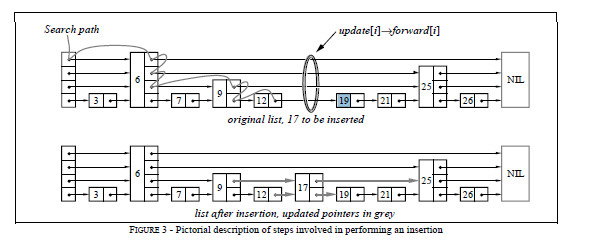skiplist思想可以具体参考这:
Skip list
View more
documents from
xuqianghitsoft
或者是参考我的这篇博文:http://www.cnblogs.com/xuqiang/archive/2011/05/22/2053516.html, leveldb中的实现方式基本上和我的那篇博文中的实现方式类似。SkipList在db/skiplist.h中声明,向外界暴漏接口非常简单,如下:
- // Create a new SkipList object that will use "cmp" for comparing keys,
- // and will allocate memory using "*arena". Objects allocated in the arena
- // must remain allocated for the lifetime of the skiplist object.
- explicit SkipList(Comparator cmp, Arena* arena);
- // Insert key into the list.
- // REQUIRES: nothing that compares equal to key is currently in the list.
- void Insert(const Key& key);
- // Returns true iff an entry that compares equal to key is in the list.
- bool Contains(const Key& key) const;
private成员变量:
- // 最大的level
- enum { kMaxHeight = 12 };
- // Immutable after construction
- Comparator const compare_;
- // 内存分配器
- Arena* const arena_; // Arena used for allocations of nodes
- // 指向第一个节点,构造函数中初始化
- Node* const head_;
- // Modified only by Insert(). Read racily by readers, but stale
- // values are ok.
- port::AtomicPointer max_height_; // Height of the entire list
- // 初始化:
- // 1. 初始化compare_
- // 2. 初始化arena_
- // 3. 初始化head_,指向指针数组
- // 4. 初始化max_height_
- // 5. 初始化rnd_随机数的seed
- // 6. 初始化head_指向的数组
- template<typename Key, class Comparator>
- SkipList<Key,Comparator>::SkipList(Comparator cmp, Arena* arena)
- : compare_(cmp),
- arena_(arena),
- head_(NewNode(0 /* any key will do */, kMaxHeight)),
- max_height_(reinterpret_cast<void*>(1)),
- rnd_(0xdeadbeef) {
- // 初始化head_指向的数组
- for (int i = 0; i < kMaxHeight; i++) {
- head_->SetNext(i, NULL);
- }
- }
下面是一个插入操作的示意图:

leveldb中实现的插入代码就是按照上面的思路实现,首先查找到合适的位置,并记录查找过程中经过的路径,之后新生成一个节点,修改指针。
- // 插入操作
- // 这里的key其实已经是经过处理的key,包含了用户指定的key和value
- template<typename Key, class Comparator>
- void SkipList<Key,Comparator>::Insert(const Key& key) {
- // TODO(opt): We can use a barrier-free variant of FindGreaterOrEqual()
- // here since Insert() is externally synchronized.
- // prev记录的是查询路径,下面需要使用prev来修改新生成
- // 节点的指针
- Node* prev[kMaxHeight];
- Node* x = FindGreaterOrEqual(key, prev);
- // Our data structure does not allow duplicate insertion
- // 不允许插入重复的值
- assert(x == NULL || !Equal(key, x->key));
- // 随即生成节点高度
- int height = RandomHeight();
- // 对prev数组中未赋值的元素进行赋值
- if (height > GetMaxHeight()) {
- for (int i = GetMaxHeight(); i < height; i++) {
- prev[i] = head_;
- }
- // It is ok to mutate max_height_ without any synchronization
- // with concurrent readers. A concurrent reader that observes
- // the new value of max_height_ will see either the old value of
- // new level pointers from head_ (NULL), or a new value set in
- // the loop below. In the former case the reader will
- // immediately drop to the next level since NULL sorts after all
- // keys. In the latter case the reader will use the new node.
- // 设置max_height变量
- max_height_.NoBarrier_Store(reinterpret_cast<void*>(height));
- }
- // 新生成一个节点,之后插入数据
- x = NewNode(key, height);
- for (int i = 0; i < height; i++) {
- // NoBarrier_SetNext() suffices since we will add a barrier when
- // we publish a pointer to "x" in prev[i].
- // 修改两部分的指针,一部分是需要执行新插入节点的指针
- // 另外的一部分是x节点的指针
- x->NoBarrier_SetNext(i, prev[i]->NoBarrier_Next(i));
- prev[i]->SetNext(i, x);
- }
- }
函数FindGreaterOrEqual中完成查询操作,就是向下(level控制)和向右(x控制)移动过程,并不断经经过路径保存到参数prev中。
- template<typename Key, class Comparator>
- typename SkipList<Key,Comparator>::Node*
- <span style="white-space:pre"> </span>SkipList<Key,Comparator>::FindGreaterOrEqual(const Key& key,
- Node** prev)
- const {
- // 从最高层开始查找
- Node* x = head_;
- int level = GetMaxHeight() - 1;
- while (true) {
- Node* next = x->Next(level);
- if (KeyIsAfterNode(key, next)) { // 向右移动
- // Keep searching in this list
- x = next;
- }
- else // 向下移动
- {
- // 记录查找路径
- if (prev != NULL)
- prev[level] = x;
- if (level == 0) {
- return next;
- } else {
- // Switch to next list下一层寻找
- level--;
- }
- }
- }
- }
查找操作基本上就是调用函数上面的函数FindGreaterOrEqual实现:
- // 查询操作
- template<typename Key, class Comparator>
- bool SkipList<Key,Comparator>::Contains(const Key& key) const {
- Node* x = FindGreaterOrEqual(key, NULL);
- if (x != NULL && Equal(key, x->key)) {
- return true;
- } else {
- return false;
- }
- }
上面基本上就是skiplist在leveldb中实现,leveldb中没有使用复杂的红黑树等机制去保证数据的有序性,而是使用了轻快的skiplist实现。最后需要注意skiplist中每个节点存储key是用户传递keyvalue经过变幻(变幻方法参考http://blog.csdn.net/xuqianghit/article/details/6948164)得到的。
v























 被折叠的 条评论
为什么被折叠?
被折叠的 条评论
为什么被折叠?








